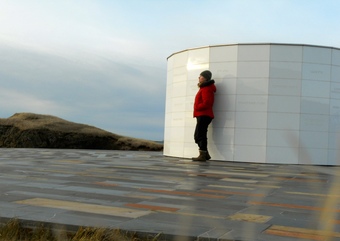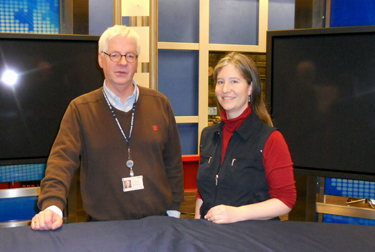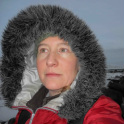 Jennifer Karchmer visited the Peace Tower located on Viðey Island just off the coast of Reykjavik, Iceland. Yoko Ono designed the Peace Tower in memory of John Lennon. “Imagine Peace” is inscribed in 24 languages on the marble sculpture.
Jennifer Karchmer visited the Peace Tower located on Viðey Island just off the coast of Reykjavik, Iceland. Yoko Ono designed the Peace Tower in memory of John Lennon. “Imagine Peace” is inscribed in 24 languages on the marble sculpture. This is part I in a series on freedom of the press. Read the next Fairhaven Free Press for an update.
As the Washington State Bureau Correspondent for Reporters Without Borders, a volunteer position I took on in 2010, I monitor freedom of the press issues, helping to protect the rights of journalists. My role is to keep an eye on censorship in Washington state and report my findings to the RWB-USA headquarters in Washington, D.C.
I advocate for my fellow journalists and bring awareness to First Amendment rights in the US. RWB, an international nonprofit organization with headquarters in Paris (known as Reporters Sans Frontières), works to improve the safety of journalists and to help defend those who have been imprisoned or persecuted for doing their jobs. RWB was started in France in 1985 with the intent to expose the mistreatment of reporters and to fight censorship and behaviors that undermine press freedom.
Today, RWB protects not only press freedom and journalists but also the right to inform and be informed. So whether you make your living as a professional journalist or you’re a citizen who uses the Internet to find movie listings, RWB is working in your best interests to protect the free flow of information.
IMMI
To better understand press freedom in my home country, I began researching the concept of press freedom outside the U.S. and came across IMMI, the Icelandic Modern Media Initiative, a proposed law in Iceland that could have implications around the globe.
Earlier this year, Western Senior Instructor and journalist Jennifer Karchmer was living in capital city Reykjavik, Iceland, which had record amounts of snowfall this season.
Basically, the idea behind IMMI (say “im-mee”) is to preserve and strengthen press freedoms worldwide. The proposal, introduced in 2010, would bring together some of the strongest media protections and free speech laws from other countries to create a progressive protection for journalists internationally.
The concept is explained in a short video on the IMMI website: immi.is/Home (runtime: 3:44). For more, an AP story posted on the WikiLeaks website sheds light on the issue as well: “Iceland court lifts gag order after public outrage,” by Herdis Sigurgisdottir, Aug. 4, 2009.
Apparently, Iceland is looking to position itself as a safe haven for journalists worldwide,
The overall topic has received coverage in the press, but my focus is the behind-the-scenes look at how news actually plays out.
Paying particular attention to how IMMI may have been sparked, I inquire: How was the news staff initially informed of the injunction? How did the decision-making process in the newsroom play out with just 5 minutes before airtime? What tools did the editors rely on to help them come to their decisions? How does the public perceive the journalism profession amid this transparency into the news cycle?
Why Iceland?
Over the past decade, Iceland has consistently ranked high (top ten) on the RWB Freedom of the Press Index. This measure of press freedom, first published in 2002, put Iceland in the top spot eight times (often tied with Finland, Norway, the Netherlands and Denmark). In 2009, Iceland was ranked 9th and then in 2010 moved back up to the top spot in a tie with several other countries—this time along with the inclusion of Sweden and Ireland. (For index results per year, click here and scroll down to the “Press Freedom Index” and “Choose a Year” drop down box.)
Another widely-cited press index, Freedom House also listed Iceland as “Free” in its 2010 Map of Press Freedom, noting “despite enduring problems associated with the global financial crisis of late 2008, the Icelandic press is still among the freest in the world.”
This leads to two research questions:
Meantime, despite these press freedom kudos, there are instances of practical compromises. In a few cases, an Icelandic journalist has been punished for what seems to be ethical, accurate and professional reporting. See the following stories:
“Don’t wait to be deprived of news to stand up and fight for it”
In addition to publishing its press freedom index, RWB put out last December this list ofthe ten most dangerous places for journalists. Among the locations: Homs, Syria, where French journalist Gilles Jacquier was killed Jan. 11; Tahrir Square in Cairo, Egypt; Veracruz state in Mexico; and the Khuzdar district of Pakistan.
Thankfully, as an American journalist who has worked for 20 years in the United States reporting for both MSM (mainstream media) outlets and small independent community newspapers, I have operated comparatively unrestricted and free of physical threats or attacks because of the words I print or say. However, censorship in the U.S. comes in a different form, more subtle as corporate influence is the foundation of much of the media messages we receive and digest. You can learn more at the Ithaca College Park Center for Independent Media. (Disclosure: Ithaca College is my alma mater.)
RWB’s slogan “Don’t wait to be deprived of news to stand up and fight for it” rings true as I acknowledge and appreciate the relative liberty I enjoy as my fellow journos in Cuba, Mexico, Pakistan and China, among other countries, work and live in repressive states—in some cases requiring reporters to have special training on how to persevere in their profession amid threats.
With freedom comes responsibility
As I continue my research into this enduring topic with in-person interviews on the ground in Reykjavik, Iceland, you won’t see me posting blips to Twitter or feeds on Facebook. Those may be fine tools for the breaking news reporter, but I prefer presenting news in a comprehensive and exacting fashion, work that goes way beyond a 30-second sound bite, 500-word brief or 140-character tweet. One of the most important tools we journalists have lost in this media landscape so very controlled by corporations and conglomerates istime—to immerse and reflect.
Jennifer Karchmer is an independent journalist who monitors and reports on freedom of the press worldwide. She is also a Senior Instructor in the Dept. of Communication at WWU. Read more at www.jenniferkarchmer.com
from: http://ffpressonline.com/2012/03/08/press-freedom-what-does-it-mean-exactly/
As the Washington State Bureau Correspondent for Reporters Without Borders, a volunteer position I took on in 2010, I monitor freedom of the press issues, helping to protect the rights of journalists. My role is to keep an eye on censorship in Washington state and report my findings to the RWB-USA headquarters in Washington, D.C.
I advocate for my fellow journalists and bring awareness to First Amendment rights in the US. RWB, an international nonprofit organization with headquarters in Paris (known as Reporters Sans Frontières), works to improve the safety of journalists and to help defend those who have been imprisoned or persecuted for doing their jobs. RWB was started in France in 1985 with the intent to expose the mistreatment of reporters and to fight censorship and behaviors that undermine press freedom.
Today, RWB protects not only press freedom and journalists but also the right to inform and be informed. So whether you make your living as a professional journalist or you’re a citizen who uses the Internet to find movie listings, RWB is working in your best interests to protect the free flow of information.
IMMI
To better understand press freedom in my home country, I began researching the concept of press freedom outside the U.S. and came across IMMI, the Icelandic Modern Media Initiative, a proposed law in Iceland that could have implications around the globe.
Earlier this year, Western Senior Instructor and journalist Jennifer Karchmer was living in capital city Reykjavik, Iceland, which had record amounts of snowfall this season.
Basically, the idea behind IMMI (say “im-mee”) is to preserve and strengthen press freedoms worldwide. The proposal, introduced in 2010, would bring together some of the strongest media protections and free speech laws from other countries to create a progressive protection for journalists internationally.
The concept is explained in a short video on the IMMI website: immi.is/Home (runtime: 3:44). For more, an AP story posted on the WikiLeaks website sheds light on the issue as well: “Iceland court lifts gag order after public outrage,” by Herdis Sigurgisdottir, Aug. 4, 2009.
Apparently, Iceland is looking to position itself as a safe haven for journalists worldwide,
The overall topic has received coverage in the press, but my focus is the behind-the-scenes look at how news actually plays out.
Paying particular attention to how IMMI may have been sparked, I inquire: How was the news staff initially informed of the injunction? How did the decision-making process in the newsroom play out with just 5 minutes before airtime? What tools did the editors rely on to help them come to their decisions? How does the public perceive the journalism profession amid this transparency into the news cycle?
Why Iceland?
Over the past decade, Iceland has consistently ranked high (top ten) on the RWB Freedom of the Press Index. This measure of press freedom, first published in 2002, put Iceland in the top spot eight times (often tied with Finland, Norway, the Netherlands and Denmark). In 2009, Iceland was ranked 9th and then in 2010 moved back up to the top spot in a tie with several other countries—this time along with the inclusion of Sweden and Ireland. (For index results per year, click here and scroll down to the “Press Freedom Index” and “Choose a Year” drop down box.)
Another widely-cited press index, Freedom House also listed Iceland as “Free” in its 2010 Map of Press Freedom, noting “despite enduring problems associated with the global financial crisis of late 2008, the Icelandic press is still among the freest in the world.”
This leads to two research questions:
- How does Iceland interpret, perceive and define freedom of the press?
- How do Iceland’s culture, geography, politics and customs influence its high press freedom ranking?
Meantime, despite these press freedom kudos, there are instances of practical compromises. In a few cases, an Icelandic journalist has been punished for what seems to be ethical, accurate and professional reporting. See the following stories:
- Iris Erlingsdottir, an Icelandic journalist, writes in the Huffington Post, “Free Speech: Not so free,” Oct. 27, 2011.
- Anna Andersen, managing editor of the Reykjavik Grapevine, publishes “An Icelandic Modern Media Inferno,” Nov. 7, 2011.
“Don’t wait to be deprived of news to stand up and fight for it”
In addition to publishing its press freedom index, RWB put out last December this list ofthe ten most dangerous places for journalists. Among the locations: Homs, Syria, where French journalist Gilles Jacquier was killed Jan. 11; Tahrir Square in Cairo, Egypt; Veracruz state in Mexico; and the Khuzdar district of Pakistan.
Thankfully, as an American journalist who has worked for 20 years in the United States reporting for both MSM (mainstream media) outlets and small independent community newspapers, I have operated comparatively unrestricted and free of physical threats or attacks because of the words I print or say. However, censorship in the U.S. comes in a different form, more subtle as corporate influence is the foundation of much of the media messages we receive and digest. You can learn more at the Ithaca College Park Center for Independent Media. (Disclosure: Ithaca College is my alma mater.)
RWB’s slogan “Don’t wait to be deprived of news to stand up and fight for it” rings true as I acknowledge and appreciate the relative liberty I enjoy as my fellow journos in Cuba, Mexico, Pakistan and China, among other countries, work and live in repressive states—in some cases requiring reporters to have special training on how to persevere in their profession amid threats.
With freedom comes responsibility
As I continue my research into this enduring topic with in-person interviews on the ground in Reykjavik, Iceland, you won’t see me posting blips to Twitter or feeds on Facebook. Those may be fine tools for the breaking news reporter, but I prefer presenting news in a comprehensive and exacting fashion, work that goes way beyond a 30-second sound bite, 500-word brief or 140-character tweet. One of the most important tools we journalists have lost in this media landscape so very controlled by corporations and conglomerates istime—to immerse and reflect.
Jennifer Karchmer is an independent journalist who monitors and reports on freedom of the press worldwide. She is also a Senior Instructor in the Dept. of Communication at WWU. Read more at www.jenniferkarchmer.com
from: http://ffpressonline.com/2012/03/08/press-freedom-what-does-it-mean-exactly/


